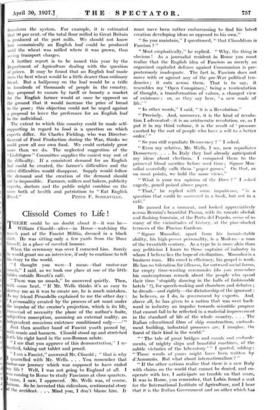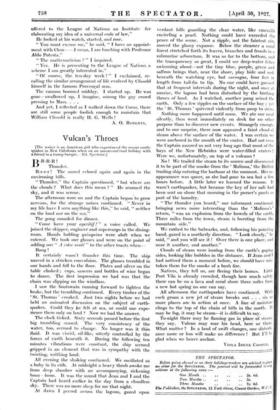Clissold Comes to Life !
THERE could be no doubt about it—it was he- ll William Clissold—alive—in Rome—watching the 11 march past of the Fascist Militia, dressed in a black shirt, lie was sitting only a few yards from the Duce himself, in a place of coveted honour.
When the ceremony was over I cornered him. Surely be would grant me an interview, if only to continue to tell his story to the world.
"I thought you were--I mean—that motor-car smash," I said, as we took our place at one of the little tables outside Rosati's cafe.
"There was no smash," he answered quietly. Then, With some heat, "If Mr. Wells thinks it's as easy to clestroy .me as it was to create me, he is much mistaken. Its my friend Pirandello explained to me the other day : it A personality created by the process of art must under • the impulse of the creator's projection, which is its life,- transcend of necessity the plane of the author's finite, • subjective conception, assuming an external reality, an independent conscious existence conditioned only—' " Just then another . band of Fascist youth passed by, With music and. banners. Clissold stood up and stretched nrth his right hand in the neo-Roman salute.
• I see that you approve of this demonstration," I re- is arked, taking out tablet and pencil.
"I am a Fascist," answered Mr. Clissold ; "that is why quarrelled with Mr. Wells. . . . You remember that ator-ear journey which was supposed to have ended Y life ? Well, I was not going to England at all. I as coming to Rome to study Fascismo at close quarters. ealne, I saw, Ti approved. Mr. Wells was, of course, urients. So he invented this ridiculous, sentimental story the fievident. . -. Mind you, I don't blame him. It must nave been rather embarrassing to find his latest creation developing ideas so opposed to his own."
"So you maintain," I questioned, "that Clissoldism is Fascism ? "
"Most emphatically," he replied. " Why, the thing is obvious ! As a journalist resident in Rome you must realize that the English idea of Fascism as merely an organized capitalist defence against Communism is pre- posterously inadequate. The fact is, Fascism does not move with or against any of the pre-War political ten- dencies; it cuts across them. That is to say, it resembles my.' Open Conspiracy,' being a reorientation of -thought, a transformation of values, a changed view of existence ; or, as they say here, a new mode of life.' " "In other words," I said, " it is a Revolution." .
"Precisely. And, moreover, it is the kind of revolu- tion I advocated—it is an aristocratic revohition, or, as I put it in my third volume, it is the result of ' pressure exerted by the sort of people who have a will to a better order.'" "So you still repudiate Democracy ? " I asked.
" Even my relative, Mr. Wells, I see, now repudiates Democracy. . . . In Italy they had 'already autieipated my ideas about elections. I compared them to the primeval blood sacrifice before seed time ; Signor Mus- solini scornfully calls them paper games.' On that, RS On most points, we hold the same views."
"What is your rea :opinion of the Duce ? " / asked eagerly, pencil poised above paper.
" That," he replied with sonic impatience, "is a question that could be answered in a book, but not in a cafe."
He paused for a moment, and looked appreciatively across Bernini's beautiful Piazza, with its roseate obelisk and flashing fountain, at the Porta del Popolo, scene of so many of the vicissitudes of history, at the pine-shaded terraces of the Pincian Gardens.
" Signor Mussolini, apart from his incontestable ability, his high-power personality, is a Modern—a man of the twentieth century. As a type lie is more akin than any politician I know to those captains of industry in whom I believe lies the hope of civilization. Mussolini is a business man. His creed is efficiency, his gospel is work. He has no toleration for idleness, for outward soicial forms, for empty time-wasting ccremonibs (do you remember his contemptuous remark about the people who spend their time stupidly dancing in the halls of fashionable hotels' ?), for speech-making and chambers and debates ; he dreads—and rightly—the dictatorship of the ignorant ; he believes, as I do, in government by experts. And, above all, he has given to a nation that was over back- ward in industry an impulse towards scientific progres; that cannot fail to be reflected in a material improvement in the standard of life of the whole country. . . . The Italian educational films of ship construction, embank- ment building, industrial processes are,. I imagine, the finest of their kind in the world."
"'The tale of great bridges and canals and embank- ments, of mighty ships and beautiful ,machines, of the subtle victories of. the laboratory ' " I quoted, adding : "Those words of yours might have been written by d'Annunzio. But what about internationalism ? "
"If the other nations realize that there is a new Italy with claims on the world that cannot be denied, and co- operate with her, I anticipate no trouble on that score. It was in Rome, -you remember, that Lubin found a seat for the International Institute of Agriculture, and I hear that it is the Italian Government and no other which has offered to the League of Nations an Institute for elaborating my idea of a universal code of law," He looked at his watch, started, and rose.
" You must excuse me," he said, " I have an appoint- ment with Clem—I mean, I am lunching with Professor Aldo Potesta."
" The mathematician ? " I inquired.
"Yes. He is presenting to the League of Nations a scheme I am greatly interested in."
"Of course, the ten-day week ! " I exclaimed, re- calling the similar arrangement of life evolved by Clissold himself in the famous Provencal mas.
The cannon boomed midday. I started up. He was gone—swallowed up, I imagine, among the gay crowd pressing to Mass. . . .
And yet, I reflected as I walked down the Corso, there are still some people foolish enough to maintain that William Clissold is really H. G. Wells !
A. 0. ROBERTS.











































 Previous page
Previous page